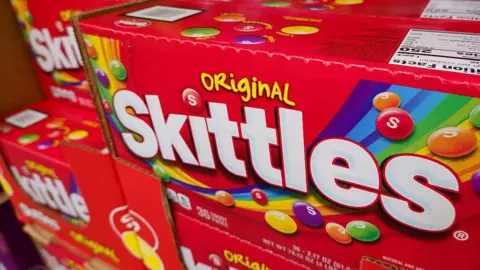Mars, a leading confectionery company known for its iconic brands, has made a significant move by phasing out titanium dioxide from its Skittles candies sold in the United States. This white pigment, used as a color additive, has faced scrutiny and was banned in the European Union since 2022 due to potential health concerns. Mars disclosed that the decision to eliminate titanium dioxide from their Skittles portfolio occurred at the end of the previous year, marking a crucial development in the company’s approach to food safety and consumer preferences.
The removal of titanium dioxide is notable in the context of ongoing debates surrounding food safety, particularly with rising public concerns about processed foods. This shift comes amid a political climate where prominent figures, such as U.S. President Donald Trump, have elevated discussions on health-related issues, notably involving the leadership of Robert F. Kennedy Jr. as the head of the Department of Health and Human Services. The timing of this decision by Mars seems to resonate with these discussions, reflecting a responsiveness to consumer advocacy for healthier food options.
Mars initially committed to phasing out artificial colors across its product lines back in 2016, indicating a trend towards adapting to consumer demands for more natural ingredients. However, the company did not specify whether consumers would perceive any differences in the product following the removal of titanium dioxide. Mars has consistently defended the safety of titanium dioxide, despite ongoing debates. The additive, widely used in various products, including baked goods and cosmetics, remains permissible in countries such as the United States, the United Kingdom, Canada, and New Zealand.
In the face of its decision, Mars faced pushback from consumer advocacy groups, pushing for stronger measures against the use of titanium dioxide in the U.S. market. Earlier this year, efforts in California aimed to ban the ingredient were thwarted, but similar advocacy continues to gain momentum in various states across the nation. Furthermore, the recent report titled “Make America Healthy Again,” released by the White House, highlighted titanium dioxide and other additives as crucial concerns, intensifying public scrutiny of these ingredients.
While Mars has opted to remove titanium dioxide, the specific reasons behind this decision remain unclear. The news broke through a report from Bloomberg but was not accompanied by detailed explanations from the company. The withdrawal of titanium dioxide from Skittles, however, is part of a broader movement in the food industry toward transparency and consumer health awareness. Mars also holds a prominent portfolio of other candies like M&Ms, Snickers, and Kind snack bars, showcasing the company’s broad impact on the confectionery market.
Historically, Skittles, which originated in the United Kingdom, have been manufactured in the U.S. since 1981, with Mars’ Wrigley division acquiring the brand in 2009. The popularity of Skittles has endured over the years, making them one of the most beloved chewy candies worldwide. The company previously encountered legal challenges regarding the use of titanium dioxide in Skittles, including a class-action lawsuit in 2022, which was ultimately dismissed.
In her statement regarding this change, a spokesperson for Mars emphasized the company’s commitment to quality and consumer safety. The representative stated that all products are designed to meet high standards and regulations set by global food safety authorities, with no compromises in this realm.
This decision by Mars to phase out titanium dioxide not only underlines the evolving landscape of consumer preferences but also emphasizes the company’s responsiveness to health concerns raised by consumers and regulators alike. As the discourse around food safety continues, the implications of this move could resonate beyond Skittles, potentially influencing other confectionery products and brands in the industry.



